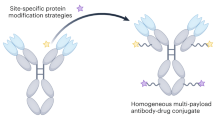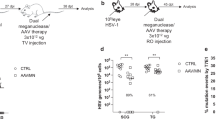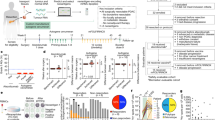Abstract
Replication-competent adenoviruses carrying the herpes simplex thymidine kinase (TK) gene have shown contradictory evidence with regard to their antitumoural efficacy in combination with ganciclovir (GCV) treatment. We generated a replication-competent adenovirus carrying Tat8-TK, a modified form of the TK gene, under the control of the adenoviral major late promoter (AdRGDTat8-TK-L). Pancreatic cancer cell lines with different sensitivity to the TK/GCV system were infected with AdRGDTat8-TK-L, both in the presence and absence of GCV, and tested for treatment efficacy. We observed that, although the presence of GCV reduced viral replication in all infected cell lines, in three out of four GCV significantly enhanced the efficacy of the virotherapy. Interestingly, the cytotoxicity of the AdRGD-Tat8-TK-L/GCV was found more potent than that of a first generation AdTK/GCV system. In tumour xenografts from BxPC-3 and NP-18 pancreatic cells, both AdRGDTat8-TK-L and AdRGDTat8-TK-L/GCV treatment showed antitumoural activity. In BxPC-3 tumours scheduling of virus and prodrug was a key factor to determine the outcome of the therapy. Importantly, the addition of GCV enhanced the antitumoural effect of AdRGDTat8-TK-L only when applied in two rounds of virus+GCV. Interestingly, in spite of interfering with viral replication in vitro, GCV treatment of NP-18 tumours did not compromise the antitumoural efficacy of the AdRGDTat8-TK-L adenovirus. Thus, our results show that the combination therapy of a replicative adenovirus and the Tat8-TK/GCV suicide system can prove beneficial, when the appropriate regimen of virus and GCV is applied.
This is a preview of subscription content, access via your institution
Access options
Subscribe to this journal
Receive 12 print issues and online access
$259.00 per year
only $21.58 per issue
Buy this article
- Purchase on Springer Link
- Instant access to full article PDF
Prices may be subject to local taxes which are calculated during checkout






Similar content being viewed by others
References
Alemany R, Balague C, Curiel DT . Replicative adenoviruses for cancer therapy. Nat Biotechnol 2000; 18: 723–727.
Nemunaitis J, Ganly I, Khuri F, Arseneau J, Kuhn J, McCarty T et al. Selective replication and oncolysis in p53 mutant tumors with ONYX-015, an E1B-55kD gene-deleted adenovirus, in patients with advanced head and neck cancer: a phase II trial. Cancer Res 2000; 60: 6359–6366.
Vecil GG, Lang FF . Clinical trials of adenoviruses in brain tumors: a review of Ad-p53 and oncolytic adenoviruses. J Neurooncol 2003; 65: 237–246.
Heise C, Lemmon M, Kirn D . Efficacy with a replication-selective adenovirus plus cisplatin-based chemotherapy: dependence on sequencing but not p53 functional status or route of administration. Clin Cancer Res 2000; 6: 4908–4914.
Khuri FR, Nemunaitis J, Ganly I, Arseneau J, Tannock IF, Romel L et al. A controlled trial of intratumoral ONYX-015, a selectively-replicating adenovirus, in combination with cisplatin and 5-fluorouracil in patients with recurrent head and neck cancer [see comments]. 2000; 6: 879–885.
You L, Yang CT, Jablons DM . ONYX-015 works synergistically with chemotherapy in lung cancer cell lines and primary cultures freshly made from lung cancer patients. Cancer Res 2000; 60: 1009–1013.
Wildner O, Morris JC, Vahanian NN, Ford H Jr, Ramsey WJ, Blaese RM . Adenoviral vectors capable of replication improve the efficacy of HSVtk/GCV suicide gene therapy of cancer. Gene Therapy 1999; 6: 57–62.
Wildner O, Blaese RM, Morris JC . Therapy of colon cancer with oncolytic adenovirus is enhanced by the addition of herpes simplex virus-thymidine kinase. Cancer Res 1999; 59: 410–413.
Wildner O, Morris JC . The role of the E1B 55 kDa gene product in oncolytic adenoviral vectors expressing herpes simplex virus-tk: assessment of antitumor efficacy and toxicity. Cancer Res 2000; 60: 4167–4174.
Morris JC, Wildner O . Therapy of head and neck squamous cell carcinoma with an oncolytic adenovirus expressing HSV-tk. Mol Ther 2000; 1: 56–62.
Lambright ES, Amin K, Wiewrodt R, Force SD, Lanuti M, Propert KJ et al. Inclusion of the herpes simplex thymidine kinase gene in a replicating adenovirus does not augment antitumor efficacy. Gene Therapy 2001; 8: 946–953.
Hakkarainen T, Hemminki A, Curiel DT, Wahlfors J . A conditionally replicative adenovirus that codes for a TK-GFP fusion protein (Ad5Delta24TK-GFP) for evaluation of the potency of oncolytic virotherapy combined with molecular chemotherapy. Int J Mol Med 2006; 18: 751–759.
Cascante A, Huch M, Rodríguez LG, González JR, Costantini L, Fillat C . Tat8-TK/GCV suicide gene therapy induces pancreatic tumor regression in vivo. Hum Gene Ther 2005; 16: 1377–1388.
Garcia-Castro J, Martínez-Palacio J, Lillo R, García-Sánchez F, Alemany R, Madero L et al. Tumor cells as cellular vehicles to deliver gene therapies to metastatic tumors. Cancer Gene Ther 2005; 12: 341–349.
Esandi MC, van Someren GD, Vincent AJ, van Bekkum, DW, Valerio D, Bout A et al. Gene therapy of experimental malignant mesothelioma using adenovirus vectors encoding the HSVtk gene. Gene Therapy 1997; 4: 280–287.
Smitt PS, Driesse M, Wolbers J, Kros M, Avezaat C . Treatment of relapsed malignant glioma with an adenoviral vector containing the herpes simplex thymidine kinase gene followed by ganciclovir. Mol Ther 2003; 7: 851–858.
Vincent AJ, Esandi MC, Avezaat CJ, Vecht CJ, Sillevis Smitt P, van Bekkum DW et al. Preclinical testing of recombinant adenoviral herpes simplex virus-thymidine kinase gene therapy for central nervous system malignancies. Neurosurgery 1997; 41: 442–451; discussion 451–442.
Suzuki K Fueyo J, Krasnykh V, Reynolds PN, Curiel DT, Alemany R . A conditionally replicative adenovirus with enhanced infectivity shows improved oncolytic potency. Clin Cancer Res 2001; 7: 120–126.
Carrio M, Romagosa A, Mercade E, Mazo A, Nadal M, Gómez-Foix AM et al. Enhanced pancreatic tumor regression by a combination of adenovirus and retrovirus-mediated delivery of the herpes simplex virus thymidine kinase gene. Gene Therapy 1999; 6: 547–553.
Rogulski KR, Wing MS, Paielli DL, Gilbert JD, Kim JH, Freytag SO . Double suicide gene therapy augments the antitumor activity of a replication-competent lytic adenovirus through enhanced cytotoxicity and radiosensitization. Hum Gene Ther 2000; 11: 67–76.
Chu RL, Post DE, Khuri FR, Van Meir EG . Use of replicating oncolytic adenoviruses in combination therapy for cancer. Clin Cancer Res 2004; 10: 5299–5312.
Carrio M, Mazo A, López-Iglesias C, Estivill X, Fillat C . Retrovirus-mediated transfer of the herpes simplex virus thymidine kinase and connexin26 genes in pancreatic cells results in variable efficiency on the bystander killing: implications for gene therapy. Int J Cancer 2001; 94: 81–88.
Dmitriev I, Krasnykh V, Miller CR, Wang M, Kashentseva E, Mikheeva G et al. An adenovirus vector with genetically modified fibers demonstrates expanded tropism via utilization of a coxsackievirus and adenovirus receptor-independent cell entry mechanism. J Virol 1998; 72: 9706–9713.
Villanueva A, Garcia C, Paules AB, Vicente M, Megías M, Reyes G et al. Disruption of the antiproliferative TGF-beta signaling pathways in human pancreatic cancer cells. Oncogene 1998; 17: 1969–1978.
Majem M, Cascallo M, Bayo-Puxan N, Mesia R, Germa JR, Alemany R . Control of E1A under an E2F-1 promoter insulated with the myotonic dystrophy locus insulator reduces the toxicity of oncolytic adenovirus Ad-Delta24RGD. Cancer Gene Ther 2006; 13: 696–705.
Alemany R, Curiel DT . CAR-binding ablation does not change biodistribution and toxicity of adenoviral vectors. Gene Therapy 2001; 8: 1347–1353.
Bayo-Puxan N, Cascallo M, Gros A, Huch M, Fillat C, Alemany R . Role of the putative heparan sulfate glycosaminoglycan-binding site of the adenovirus type 5 fiber shaft on liver detargeting and knob-mediated retargeting. J Gen Virol 2006; 87: 2487–2495.
Bewig B, Schmidt WE . Accelerated titering of adenoviruses. Biotechniques 2000; 28: 870–873.
Pinheiro JC, Bates DM . Mixed-Effects Models in S and S-PLUS. Springer-Verlag: New York, 2000.
Acknowledgements
This was supported by a grant from the Spanish Ministry of Education and Science, BIO2005–08682-C03–02/01 and received partial support from the Generalitat de Catalunya SGR0500008 and European Commission Theradpox contract LSHB-CT-2005–018700. A Cascante was supported by a pre-doctoral fellowship (FPU) granted by the Spanish Ministry of Education and Science, D Abate-Daga was a pre-doctoral fellow of the Fundación Carolina and Laura Garcia-Rodríguez was a pre-doctoral fellow (FI) of the Generalitat de Catalunya.
Author information
Authors and Affiliations
Corresponding author
Rights and permissions
About this article
Cite this article
Cascante, A., Abate-Daga, D., Garcia-Rodríguez, L. et al. GCV modulates the antitumoural efficacy of a replicative adenovirus expressing the TAT8-TK as a late gene in a pancreatic tumour model. Gene Ther 14, 1471–1480 (2007). https://doi.org/10.1038/sj.gt.3303008
Received:
Revised:
Accepted:
Published:
Issue Date:
DOI: https://doi.org/10.1038/sj.gt.3303008
Keywords
This article is cited by
-
Translational reprogramming in tumour cells can generate oncoselectivity in viral therapies
Nature Communications (2017)
-
Codon optimization of the adenoviral fiber negatively impacts structural protein expression and viral fitness
Scientific Reports (2016)
-
Oncolytic virotherapy for urological cancers
Nature Reviews Urology (2016)
-
MiR-148a- and miR-216a-regulated Oncolytic Adenoviruses Targeting Pancreatic Tumors Attenuate Tissue Damage Without Perturbation of miRNA Activity
Molecular Therapy (2014)
-
GALV expression enhances the therapeutic efficacy of an oncolytic adenovirus by inducing cell fusion and enhancing virus distribution
Gene Therapy (2012)



